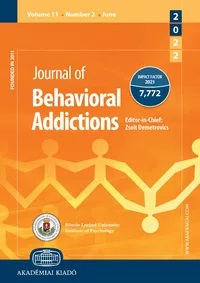Systematic reviews and meta-analyses of treatment interventions for Internet use disorders: Critical analysis of the methodical quality according to the PRISMA guidelines
Systematic reviews and meta-analyses of treatment interventions for Internet use disorders: Critical analysis of the methodical quality according to the PRISMA guidelines
Author(s): Lara Basenach, Babette Renneberg, Harriet Salbach, Michael Dreier, Klaus WölflingSubject(s): Behaviorism
Published by: Akadémiai Kiadó
Keywords: Internet use disorder; SRMA of treatment intervention for IUD; evaluation of reporting quality
Summary/Abstract: As a result of concerns about predominantly online behavioral addictions, an increasing number of systematic reviews and meta-analyses (SRMA) of treatment interventions for internet use disorders (IUD) are being recorded. This review was designed to (a) systematically identify the evidence base of SRMA and to (b) critically appraise the quality of reporting according to the Preferred Reporting Items for Systematic Reviews and Meta-Analyses (PRISMA) guidelines. Four databases were searched until August 2022 to systematically identify SRMA. PRISMA indicators were evaluated on a three-level response format to obtain an overall score operationalizing the quality of reporting (score range: 0–84). Additionally, the percentage of adherence to the PRISMA indicators was calculated. Reporting quality of 23 SRMA, comprising 12 systematic reviews and 11 meta-analyses was evaluated. Quality scores ranged from 25 to 77 (M: 52.91; SD: 17.46). Results of the critical appraisal revealed deviations from the PRISMA indicators, including missing information on (a) registration of a study protocol, (b) statistical synthesis methods (c) evaluation of certainty of evidence, and (d) risk of bias assessment. Eleven (47.83%) of the SRMAs partially adhered, and twelve (52.17%) completely adhered to the PRISMA indicators. This first critical appraisal on the reporting quality of SRMA on treatment interventions for IUD highlights limitations of the evidence base. Inadequate reporting compromises the practical utility and validity of SRMA and may complicate ongoing efforts of consensus on evidence-based interventions for IUD. Future research should focus on sufficient and transparent reporting of the methodological approach.
Journal: Journal of Behavioral Addictions
- Issue Year: 12/2023
- Issue No: 1
- Page Range: 9-25
- Page Count: 17
- Language: English

